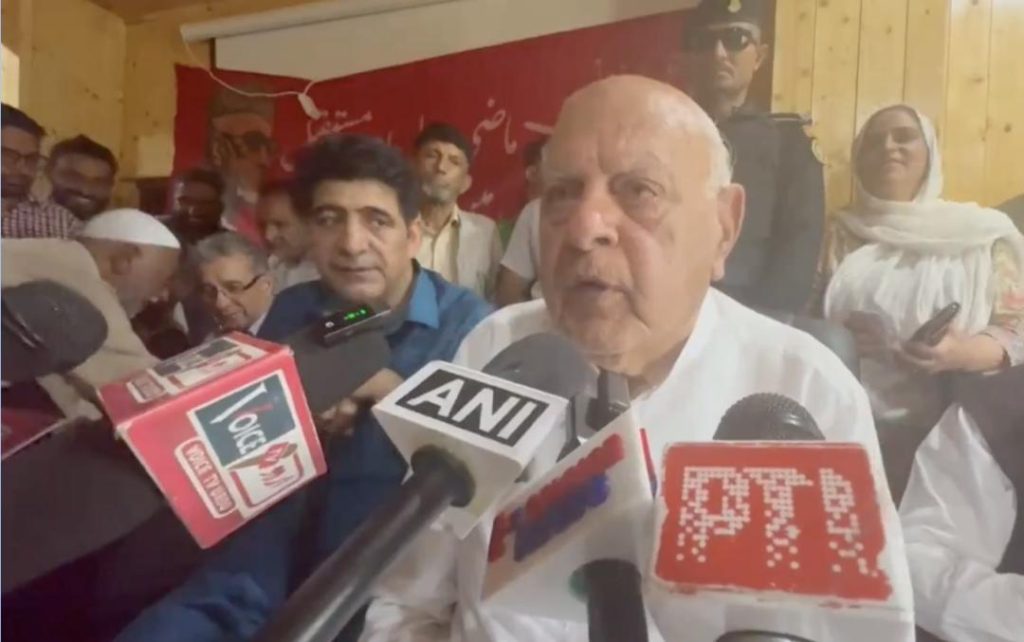
Will Move SC Over J&K Statehood Restoration Delay: Farooq Abdullah
The political climate in Jammu and Kashmir has been a subject of intense scrutiny in recent times. The region, which was a state until August 2019, was downgraded to a Union Territory (UT) after the Narendra Modi-led government revoked Article 370. While the central government has taken several steps to ensure the region’s development, one of the key demands of the people of Jammu and Kashmir remains the restoration of statehood. The National Conference (NC), a prominent political party in the region, has been at the forefront of demanding statehood for Jammu and Kashmir. Recently, its president, Farooq Abdullah, made a significant statement, warning that his party will approach the Supreme Court if there is an inordinate delay in the restoration of statehood.
Abdullah’s statement came in the wake of the recent assembly elections in Jammu and Kashmir. The elections, which were held in August and September 2020, resulted in the National Conference emerging as the second-largest party. The People’s Alliance for Gupkar Declaration (PAGD), a coalition of regional parties, including the National Conference, the People’s Democratic Party (PDP), and the Communist Party of India (Marxist) (CPI-M), won 37 seats in the 83-member assembly. The Bharatiya Janata Party (BJP), the ruling party at the Centre, won 74 seats.
In an interview with a national daily, Abdullah expressed his party’s frustration with the Centre’s lack of progress on restoring statehood to Jammu and Kashmir. “After the elections, people wanted their issues to be resolved immediately, but statehood (not being restored) is stopping us,” he said. When asked if his party would approach the Supreme Court if there is a delay, Abdullah replied, “Of course, we will. We have the right to ask the court to intervene.”
Abdullah’s statement has been seen as a strong warning to the Centre, which has been slow to respond to the demand for statehood. The National Conference has been demanding statehood for Jammu and Kashmir since the UT was formed. The party’s leader, Farooq Abdullah, has been a vocal critic of the Centre’s decision to scrap Article 370, which gave special status to Jammu and Kashmir. He has repeatedly called for the restoration of statehood, citing the people’s desire to govern themselves.
The demand for statehood is not limited to the National Conference. Other regional parties, including the PDP, have also been demanding statehood. The PDP, which was the ruling party in Jammu and Kashmir until 2015, has been a key player in the state’s politics. Its leader, Mehbooba Mufti, has been a vocal critic of the Centre’s decision to scrap Article 370. She has repeatedly called for the restoration of statehood, citing the people’s desire to govern themselves.
The demand for statehood is not limited to the political parties. The people of Jammu and Kashmir have also been demanding statehood. A recent survey conducted by the Centre for the Study of Developing Societies (CSDS) found that 70% of the respondents in Jammu and Kashmir want the region to be restored to its pre-2019 status as a state. The survey also found that 60% of the respondents believe that the Centre’s decision to scrap Article 370 was wrong.
The delay in restoring statehood to Jammu and Kashmir has been attributed to several factors. One of the main reasons is the Centre’s insistence on implementing the Delimitation Commission’s report, which is expected to redraw the electoral boundaries in the region. The Delimitation Commission was set up by the Centre in 2020 to review the electoral boundaries in Jammu and Kashmir. The commission’s report is expected to be tabled in the Parliament soon, but the Centre has not given a timeline for restoring statehood.
Another reason for the delay is the Centre’s unwillingness to engage with the regional parties on the issue of statehood. The National Conference and the PDP have been demanding statehood, but the Centre has not held talks with them on the issue. Instead, the Centre has been pushing for the formation of a new government in Jammu and Kashmir, which would be responsible for implementing the Centre’s decisions.
The delay in restoring statehood to Jammu and Kashmir has serious implications for the region’s political landscape. The people of Jammu and Kashmir are frustrated with the Centre’s inaction on the issue, and there is growing discontent among the youth. The delay has also led to a sense of alienation among the people, who feel that their voices are not being heard.
In conclusion, Farooq Abdullah’s statement warning that his party will approach the Supreme Court if there is an inordinate delay in the restoration of statehood to Jammu and Kashmir is a significant development in the region’s politics. The Centre’s delay in restoring statehood has been attributed to several factors, including the implementation of the Delimitation Commission’s report and the unwillingness to engage with the regional parties on the issue. The delay has serious implications for the region’s political landscape, and it is essential that the Centre takes steps to address the people’s demands.






